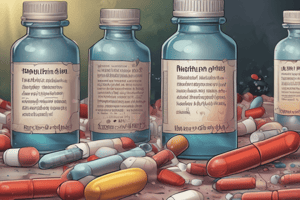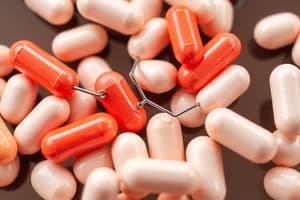Podcast
Questions and Answers
What is the primary mechanism through which penicillins exert their antibacterial effect?
What is the primary mechanism through which penicillins exert their antibacterial effect?
- Inhibition of protein synthesis
- Inhibition of bacterial wall cell synthesis (correct)
- Disruption of bacterial membrane integrity
- Interference with nucleic acid synthesis
Which of the following adverse effects is commonly associated with the use of amoxicillin?
Which of the following adverse effects is commonly associated with the use of amoxicillin?
- Respiratory failure
- Neuropathic pain
- Skin rashes (correct)
- Hepatic failure
Which condition is a contraindication for administering penicillins?
Which condition is a contraindication for administering penicillins?
- Hypertension
- Allergy to cephalosporins (correct)
- Diabetes mellitus
- Chronic asthma
How do beta-lactamase enzyme inhibitors affect the efficacy of penicillins?
How do beta-lactamase enzyme inhibitors affect the efficacy of penicillins?
What potential interaction may occur with oral contraceptives when using penicillins?
What potential interaction may occur with oral contraceptives when using penicillins?
What is a primary action of Nafcillin in treating bacterial infections?
What is a primary action of Nafcillin in treating bacterial infections?
Which of the following is a caution associated with Cephalosporins?
Which of the following is a caution associated with Cephalosporins?
What type of infections is Azithromycin primarily used to treat?
What type of infections is Azithromycin primarily used to treat?
What type of infections are Cefepime and Ceftriaxone commonly used to treat?
What type of infections are Cefepime and Ceftriaxone commonly used to treat?
Which potential side effect is associated with the use of Cefepime?
Which potential side effect is associated with the use of Cefepime?
What are the potential gastrointestinal symptoms associated with Erythromycin?
What are the potential gastrointestinal symptoms associated with Erythromycin?
Which of the following is NOT a characteristic of Lincosamides?
Which of the following is NOT a characteristic of Lincosamides?
What effect does the macrolide class of antibiotics have on bacterial cells?
What effect does the macrolide class of antibiotics have on bacterial cells?
For which type of infection is Clindamycin indicated?
For which type of infection is Clindamycin indicated?
What is a potential side effect of administering Azithromycin intravenously?
What is a potential side effect of administering Azithromycin intravenously?
What does the administration of Erythromycin involve to avoid phlebitis?
What does the administration of Erythromycin involve to avoid phlebitis?
Which bacterial type is Clindamycin effective against?
Which bacterial type is Clindamycin effective against?
What is the primary mechanism of action of Glycopeptides in treating infections?
What is the primary mechanism of action of Glycopeptides in treating infections?
What is a potential serious adverse effect of vancomycin that requires monitoring?
What is a potential serious adverse effect of vancomycin that requires monitoring?
Which of the following conditions indicates a contraindication for the use of tetracyclines?
Which of the following conditions indicates a contraindication for the use of tetracyclines?
What adverse effect is commonly associated with the use of aminoglycosides like gentamicin?
What adverse effect is commonly associated with the use of aminoglycosides like gentamicin?
What is the primary action of fluoroquinolones?
What is the primary action of fluoroquinolones?
In which scenario are fluoroquinolones typically indicated?
In which scenario are fluoroquinolones typically indicated?
What can enhance the absorption of tetracyclines when taken with food?
What can enhance the absorption of tetracyclines when taken with food?
Which of the following can potentially increase the risk of nephrotoxicity when using aminoglycosides?
Which of the following can potentially increase the risk of nephrotoxicity when using aminoglycosides?
What is the mechanism through which amoxicillin exerts its antibacterial action?
What is the mechanism through which amoxicillin exerts its antibacterial action?
Which adverse effect is NOT typically associated with amoxicillin use?
Which adverse effect is NOT typically associated with amoxicillin use?
What type of bacteria do penicillins primarily target?
What type of bacteria do penicillins primarily target?
Which of the following is a potential consequence of combining penicillins with beta-lactamase enzyme inhibitors?
Which of the following is a potential consequence of combining penicillins with beta-lactamase enzyme inhibitors?
Which condition is indicated as a contraindication for the use of penicillins?
Which condition is indicated as a contraindication for the use of penicillins?
What is a significant caution to consider when prescribing penicillins?
What is a significant caution to consider when prescribing penicillins?
How do acidic fruits and juices impact the effectiveness of penicillins?
How do acidic fruits and juices impact the effectiveness of penicillins?
What is a common adverse effect associated with Cephalosporins?
What is a common adverse effect associated with Cephalosporins?
Which bacterial infections can Nafcillin effectively treat?
Which bacterial infections can Nafcillin effectively treat?
What potential complication may arise from administering Cefepime?
What potential complication may arise from administering Cefepime?
How does Ceftriaxone primarily exert its antibacterial effect?
How does Ceftriaxone primarily exert its antibacterial effect?
What type of infections is Macrolides, such as Erythromycin, commonly prescribed for?
What type of infections is Macrolides, such as Erythromycin, commonly prescribed for?
Which of the following precautions is necessary when using Ceftriaxone?
Which of the following precautions is necessary when using Ceftriaxone?
What is a potential reaction when using antibiotics like Cefepime with anticoagulants?
What is a potential reaction when using antibiotics like Cefepime with anticoagulants?
What effect do Macrolide antibiotics have on bacterial cells?
What effect do Macrolide antibiotics have on bacterial cells?
In what scenarios would Cephalosporins be prescribed with caution?
In what scenarios would Cephalosporins be prescribed with caution?
What is a primary adverse effect associated with vancomycin administration?
What is a primary adverse effect associated with vancomycin administration?
Which condition is contraindicated when using tetracyclines?
Which condition is contraindicated when using tetracyclines?
For what reason should the peak levels of aminoglycosides be monitored?
For what reason should the peak levels of aminoglycosides be monitored?
What is the primary mechanism of action for fluoroquinolones?
What is the primary mechanism of action for fluoroquinolones?
What is a common side effect of using aminoglycosides?
What is a common side effect of using aminoglycosides?
In which circumstances would fluoroquinolones typically be reserved for use?
In which circumstances would fluoroquinolones typically be reserved for use?
Which of the following adverse effects is associated with the use of tetracyclines?
Which of the following adverse effects is associated with the use of tetracyclines?
What is the recommended method of administering vancomycin to minimize the risk of toxicity?
What is the recommended method of administering vancomycin to minimize the risk of toxicity?
Which interaction is important to consider when prescribing tetracyclines?
Which interaction is important to consider when prescribing tetracyclines?
What is a notable effect of red man syndrome linked to vancomycin?
What is a notable effect of red man syndrome linked to vancomycin?
What is the primary action of Sulfonamides in bacterial infections?
What is the primary action of Sulfonamides in bacterial infections?
Which adverse effect is associated with the use of Trimethoprim-Sulfamethoxazole?
Which adverse effect is associated with the use of Trimethoprim-Sulfamethoxazole?
What is an important precaution to take when administering Nitroimidazoles?
What is an important precaution to take when administering Nitroimidazoles?
What effect do Sulfonamides have when used in combination with Trimethoprim?
What effect do Sulfonamides have when used in combination with Trimethoprim?
Which condition should be monitored when using Theophylline in patients with myasthenia gravis?
Which condition should be monitored when using Theophylline in patients with myasthenia gravis?
What is the action of the macrolide antibiotic Azithromycin at low doses?
What is the action of the macrolide antibiotic Azithromycin at low doses?
Which symptom is not associated with the use of Erythromycin?
Which symptom is not associated with the use of Erythromycin?
What major adverse effect can occur if Clindamycin is administered?
What major adverse effect can occur if Clindamycin is administered?
For which type of infections is Clindamycin specifically indicated?
For which type of infections is Clindamycin specifically indicated?
Which type of bacterial infection is primarily treated using Azithromycin?
Which type of bacterial infection is primarily treated using Azithromycin?
What should be done when administering intravenous Erythromycin?
What should be done when administering intravenous Erythromycin?
Which statement is true regarding the action of Lincosamides?
Which statement is true regarding the action of Lincosamides?
What must be considered when giving theophylline alongside other medications?
What must be considered when giving theophylline alongside other medications?
What characteristic of Clindamycin makes it effective against MRSA?
What characteristic of Clindamycin makes it effective against MRSA?
Which of the following is a precaution when using azithromycin?
Which of the following is a precaution when using azithromycin?
Flashcards
Penicillin mechanism of action
Penicillin mechanism of action
Penicillins inhibit bacterial cell wall synthesis by interfering with the bacterial enzyme needed for cell division and cellular synthesis.
Adverse effects of Amoxicillin
Adverse effects of Amoxicillin
GI upset (nausea, vomiting, diarrhea), Allergic reactions (anaphylaxis), Superinfections, and renal impairment.
Amoxicillin use caution
Amoxicillin use caution
Caution is needed for penicillin-allergic patients, patients with renal impairment, and those with a history of GI issues, like ulcerative colitis or pseudomembranous colitis.
Penicllinase-Resistant Penicillins
Penicllinase-Resistant Penicillins
Signup and view all the flashcards
Penicillins administration
Penicillins administration
Signup and view all the flashcards
Nafcillin
Nafcillin
Signup and view all the flashcards
Cephalosporins
Cephalosporins
Signup and view all the flashcards
Cefepime
Cefepime
Signup and view all the flashcards
Macrolides
Macrolides
Signup and view all the flashcards
Erythromycin
Erythromycin
Signup and view all the flashcards
Theophylline Use
Theophylline Use
Signup and view all the flashcards
Erythromycin Action
Erythromycin Action
Signup and view all the flashcards
Azithromycin's Role
Azithromycin's Role
Signup and view all the flashcards
Azithromycin Administration
Azithromycin Administration
Signup and view all the flashcards
Lincosamide Mechanism
Lincosamide Mechanism
Signup and view all the flashcards
Clindamycin Uses
Clindamycin Uses
Signup and view all the flashcards
Clindamycin Adverse Effects
Clindamycin Adverse Effects
Signup and view all the flashcards
Clindamycin Administration
Clindamycin Administration
Signup and view all the flashcards
Vancomycin's Action
Vancomycin's Action
Signup and view all the flashcards
Vancomycin's Use Cases
Vancomycin's Use Cases
Signup and view all the flashcards
Vancomycin: Red Man Syndrome
Vancomycin: Red Man Syndrome
Signup and view all the flashcards
Tetracyclines: Mechanism of Action
Tetracyclines: Mechanism of Action
Signup and view all the flashcards
Tetracyclines: Contraindications
Tetracyclines: Contraindications
Signup and view all the flashcards
Aminoglycosides (Gentamicin): Mechanism of Action
Aminoglycosides (Gentamicin): Mechanism of Action
Signup and view all the flashcards
Aminoglycosides: Monitoring
Aminoglycosides: Monitoring
Signup and view all the flashcards
Penicillins: Mechanism
Penicillins: Mechanism
Signup and view all the flashcards
Amoxicillin: Uses
Amoxicillin: Uses
Signup and view all the flashcards
Amoxicillin: Adverse Effects
Amoxicillin: Adverse Effects
Signup and view all the flashcards
Penicillinase-Resistant Penicillins: Why?
Penicillinase-Resistant Penicillins: Why?
Signup and view all the flashcards
Amoxicillin: Drug Interaction
Amoxicillin: Drug Interaction
Signup and view all the flashcards
Amoxicillin: Enhancement
Amoxicillin: Enhancement
Signup and view all the flashcards
Erythromycin MOA
Erythromycin MOA
Signup and view all the flashcards
What is Azithromycin used for?
What is Azithromycin used for?
Signup and view all the flashcards
Clindamycin MOA
Clindamycin MOA
Signup and view all the flashcards
Clindamycin Side Effects
Clindamycin Side Effects
Signup and view all the flashcards
Lincosamide MOA
Lincosamide MOA
Signup and view all the flashcards
Vancomycin MOA
Vancomycin MOA
Signup and view all the flashcards
Why is vancomycin used?
Why is vancomycin used?
Signup and view all the flashcards
Theophylline: When to Monitor?
Theophylline: When to Monitor?
Signup and view all the flashcards
Sulfonamides: Action
Sulfonamides: Action
Signup and view all the flashcards
Trimethoprim-Sulfamethoxazole: Why Combo?
Trimethoprim-Sulfamethoxazole: Why Combo?
Signup and view all the flashcards
Nitroimidazoles: Mechanism
Nitroimidazoles: Mechanism
Signup and view all the flashcards
Metronidazole: When to Use?
Metronidazole: When to Use?
Signup and view all the flashcards
Red Man Syndrome
Red Man Syndrome
Signup and view all the flashcards
Tetracycline's Action
Tetracycline's Action
Signup and view all the flashcards
Aminoglycoside's Action
Aminoglycoside's Action
Signup and view all the flashcards
Fluoroquinolone's Action
Fluoroquinolone's Action
Signup and view all the flashcards
Fluoroquinolone's Contraindications
Fluoroquinolone's Contraindications
Signup and view all the flashcards
Fluoroquinolone's Administration
Fluoroquinolone's Administration
Signup and view all the flashcards
Nafcillin: What's it for?
Nafcillin: What's it for?
Signup and view all the flashcards
Ceftriaxone (3rd Gen Cephalosporin): How does it work?
Ceftriaxone (3rd Gen Cephalosporin): How does it work?
Signup and view all the flashcards
Cefepime (4th Gen Cephalosporin): Main use?
Cefepime (4th Gen Cephalosporin): Main use?
Signup and view all the flashcards
Macrolides: What do they do?
Macrolides: What do they do?
Signup and view all the flashcards
Erythromycin: How does it work?
Erythromycin: How does it work?
Signup and view all the flashcards
Pseudomembranous colitis: What's the connection?
Pseudomembranous colitis: What's the connection?
Signup and view all the flashcards
Clindamycin: What's its strength?
Clindamycin: What's its strength?
Signup and view all the flashcards
Vancomycin: Why is it used?
Vancomycin: Why is it used?
Signup and view all the flashcards
Red Man Syndrome: What is it?
Red Man Syndrome: What is it?
Signup and view all the flashcards
Study Notes
Antibiotics, Antivirals, Antifungals
-
Penicillins (broad spectrum):
- Mechanism: Beta-lactam ring interferes with bacterial cell wall synthesis.
- Indications: Otitis media, tonsillitis, sinusitis, respiratory and urinary tract infections (gram-positive and negative bacteria).
- Adverse effects: Gastrointestinal (GI) upset (nausea, vomiting, diarrhea), discoloration of teeth, hypersensitivity reactions (anaphylaxis).
- Contraindications: Allergy to penicillins.
- Misc: Penicillinase-resistant penicillins (e.g., nafcillin) treat penicillinase-producing S. aureus infections (endocarditis)
- Additional notes: May decrease effectiveness of oral contraceptives if used concurrently.
-
Amoxicillin:
- Mechanism of Action: Similar to other penicillins, inhibiting bacterial enzyme necessary for cell division and cellular synthesis.
- Indication: Otitis media, tonsillitis, sinusitis, respiratory and urinary tract infections (gram-positive and negative bacteria).
- Adverse effects: GI discomfort (nausea, diarrhea), allergic reactions.
- Misc: No specific additional info beyond the general penicillin notes. Decreased efficacy with acidic fruits and juices.
-
Penicillinase-Resistant Penicillins (e.g., Nafcillin):
- Mechanism of Action: Similar to other penicillins, but resistant to bacterial enzymes that break down penicillins.
- Indication: Used to treat bacterial infections caused by penicillin-resistant bacteria, such as S. aureus.
- Adverse Effects: GI upset (abdominal pain, nausea, vomiting, diarrhea), renal impairment, ulcerative colitis, pseudomembranous colitis, other general adverse effects.
- Misc: Effective against penicillinase-producing S. aureus.
-
Cephalosporins:
- Mechanism: Inhibits bacterial cell wall synthesis.
- Indications: Otitis media, meningitis.
- Adverse Effects: Gastrointestinal upset (GI distress), phlebitis & injection site reaction, hypersensitivity to penicillins.
- Contraindications: Hypersensitivity to penicillins.
-
Macrolides (broad spectrum):
- Mechanism: Bind to 50S ribosomal subunits to inhibit protein synthesis.
- Indications: Respiratory infections, C. difficile diarrhea.
- Adverse Effects: Gastrointestinal distress (diarrhea), including C. difficile infections, and interactions with other drugs.
-
Erythromycin, Azithromycin:
- Mechanism of action - broad spectrum to inhibit protein synthesis and bacteriostatic / bacteriocidal at low dose
- Indication- respiratory infections (including pneumonia), C. difficile infections.
- Adverse effects - C. difficile infections, may interact with other meds, and GI Distress.
-
Tetracyclines (e.g., Doxycycline):
- Mechanism: Inhibit bacterial protein synthesis.
- Indications: Respiratory, urinary tract, and skin infections. More specific indications are present for certain types.
- Adverse effects: Teeth staining, bone damage, skin reactions, liver function abnormalities, including GI distress and hepatotoxicity.
- Interactions: Avoid use with milk and calcium-containing products as they impair absorption.
-
Aminoglycosides (Gentamicin):
- Mechanism: Inhibits bacterial protein synthesis.
- Indications: Serious bacterial infections.
- Adverse effects: Nephrotoxicity, ototoxicity (potential damage to hearing nerves) Important Note: Monitor peak and trough levels for appropriate dosage.
-
Fluoroquinolones (e.g., Ciprofloxacin, Levofloxacin):
- Mechanism: Interferes with DNA synthesis.
- Indications: Urinary tract infections.
- Adverse effects: CNS effects (headache, dizziness), GI distress, Bone marrow depression.
- Misc: Reserved for patients for those without comparable treatment options. Caution with interactions with other drugs.
-
Sulfonamides (e.g., Trimethoprim-Sulfamethoxazole):
- Mechanism: Inhibition of bacterial synthesis of folic acid.
- Indications: Urinary tract, respiratory, and ear infections, Pneumocystis carinii pneumonia.
- Adverse Effects: CNS effects (headache, dizziness), GI distress, hepatotoxicity.
- Misc: Combination drug; helps with bacterial resistance. May also cause hypoglycemia with some types of oral antidiabetes drugs.
-
Nitroimidazoles (e.g., Metronidazole):
- Mechanism: Disrupts DNA and protein synthesis in bacteria & protozoa.
- Indications: Intra-abdominal and respiratory infections, and H. pylori.
- Adverse effects: CNS effects (headache, dizziness), GI distress.
- Misc: Crystalluria; take with full glass and sufficient fluids to prevent issues.
-
Antitubercular (e.g., Isoniazid):
- Mechanism: Inhibits bacterial cell wall synthesis, interfering with lipid and DNA synthesis.
- Indication: Tuberculosis
- Adverse Effects: Peripheral neuropathy, hepatotoxicity, ocular toxicity.
- Misc: Administer on empty stomach.
-
Antimycobacterial (e.g., Rifampin):
- Mechanism: Inhibits bacterial synthesis, interfering with lipid and DNA synthesis.
- Indications: Tuberculosis
- Adverse Effects: Hepatotoxicity, body fluid may change color to orange, soft contact lenses may be permanently discolored.
- Misc: Administer on empty stomach.
-
Antifungals (e.g., Fluconazole):
- Mechanism: Inhibits the fungal cell membrane synthesis.
- Indications: Cryptococcal meningitis, some respiratory tract infections.
- Adverse Effects: Headache, Rash, and may interact with other drugs.
-
Antivirals for Influenza (e.g., Oseltamivir):
- Mechanism: Decreases the release of the virus from infected cells.
- Indications: Influenza (flu).
- Adverse Effects: CNS effects, including headache, dizziness, nausea and/or vomiting.
- Misc: Should be taken within 48 hours of flu symptoms.
-
Herpes Antivirals (e.g., Acyclovir, Valacyclovir):
- Mechanism: Inhibit viral DNA synthesis. Prevents multiplication in the body.
- Indications: Herpes simplex viruses (HSV), chicken pox (varicella).
- Adverse Effects: GI distress, headache, kidney dysfunction.
- Misc: Monitor Kidney Function for safety; can be given IV as well as orally.
-
Antivirals for HIV (Nucleoside e.g. Zidovudine):
- Mechanism: Inhibits viral enzyme reverse transcriptase and inhibits viral replication.
- Indications: HIV infection.
- Adverse Effects: Peripheral neuropathy, myopathy, pancreatitits, and others.
-
General Notes:
- Liver function tests (LFTs): Monitor for drugs that affect liver function.
- Kidney function tests: Monitor for drugs that affect kidney function.
- Drug interactions: Check for interactions before prescribing the drugs.
- Adverse effects: Review all known adverse effects, precautions and potential interactions.
Studying That Suits You
Use AI to generate personalized quizzes and flashcards to suit your learning preferences.




